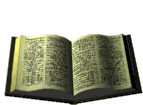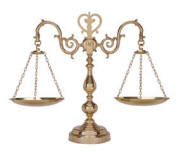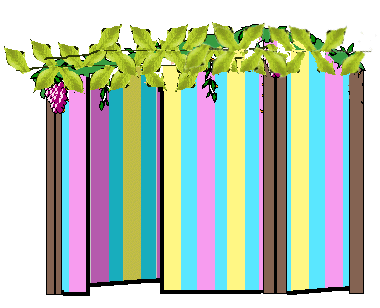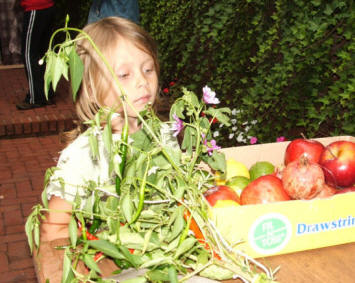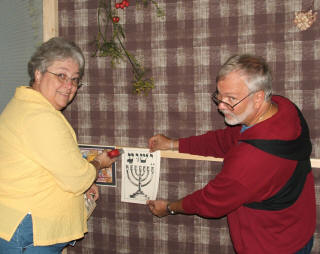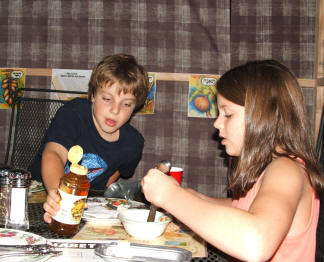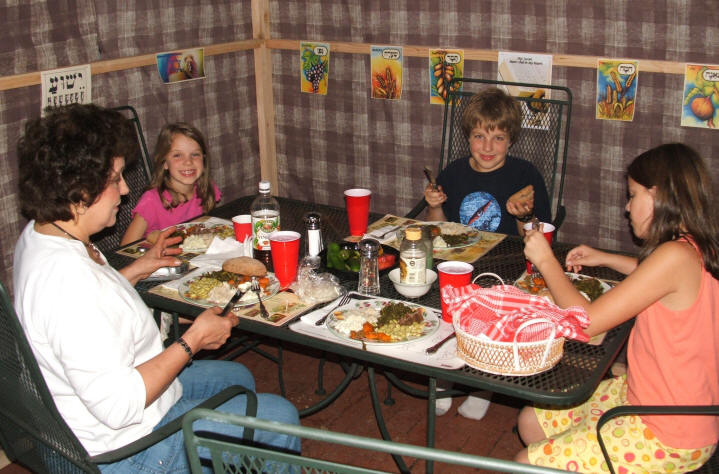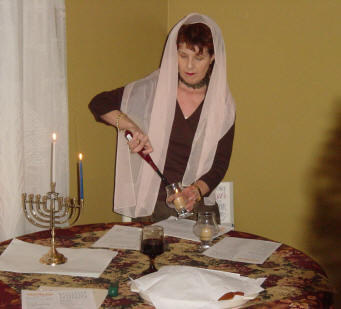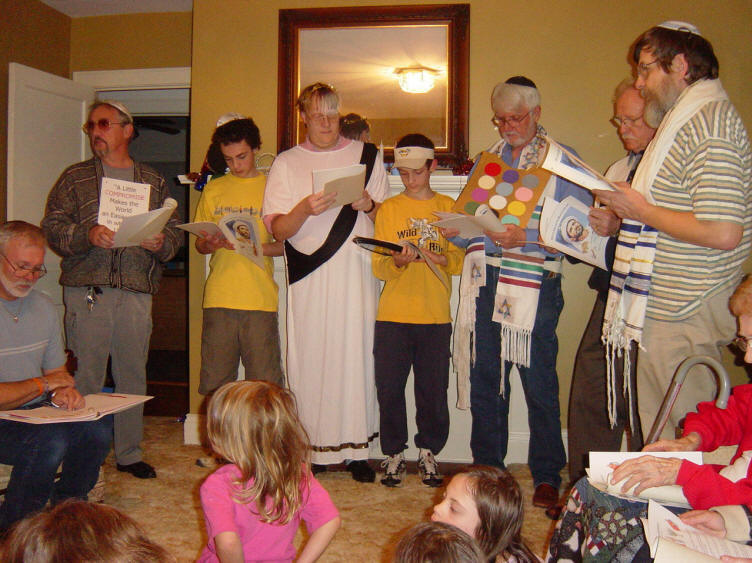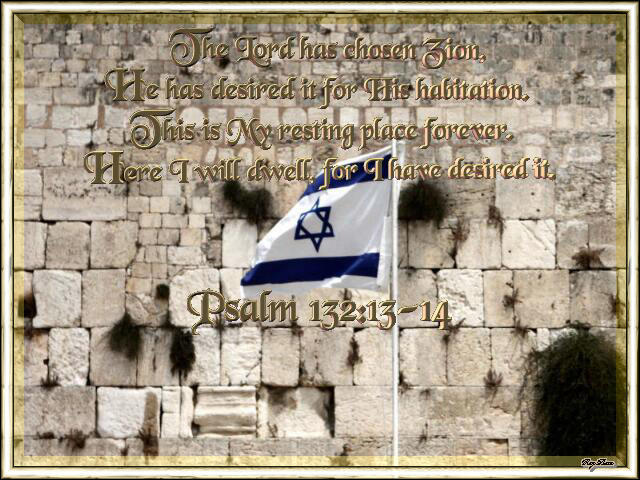Beit Yeshua
2006
May to December
Erev
SHABBAT
YOM TERUAH
(Rosh Hashanah)
YOM
KIPPUR
SUKKOT
HANUKKAH
May 26, 2006 Erev Shabbat Meeting at THE RIVER
Pastor Bill invited us to have our May 26th Erev Shabbat (Sabbath Evening) meeting at THE RIVER.
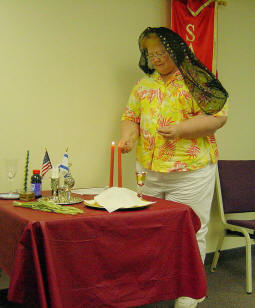
Nancy lights Shabbat candles. Pastor Bill does the blessings over the bread & wine.
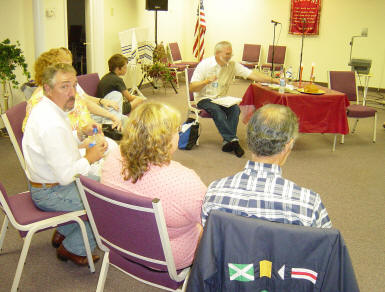
Our teaching for the evening was "Shabbat".
(1) What is Shabbat? a. A Gift from Adonai
Exodus 16: 23He said to them, “This is what the LORD commanded: ‘Tomorrow is to be a day of rest, aholy Sabbath to the LORD. So bake what you want to bake and boil what you want to boil.
Save whatever is left and keep it until morning.’”b. A Time to Rest
Exodus 20: 8“Remember the Sabbath day by keeping it holy. 9Six days you shall labor and do all yourwork, 10but the seventh day is a Sabbath to the Lord your God. On it you shall not do any
work, neither you, nor your son or daughter, nor your manservant or maidservant, nor your
animals, nor the alien within your gates.c. A Delight
Isaiah 58: 13“If you keep your feet from breaking the Sabbath and from doing as you please on my holy
day, if you call the Sabbath a delight and the LORD'S holy day honorable, and if you honor it by
not going your own way and not doing as you please or speaking idle words, 14then you will find
your joy in the LORD, and I will cause you to ride on the heights of the land and to feast on the
inheritance of your father Jacob."(2) Why Observe Shabbat? a. It's Perpetual
Exodus 31: 16Wherefore the children of Israel shall keep the sabbath, to observe the sabbath throughout
their generations, for a perpetual covenant.b. It Honors the Lord
Isaiah 58: 13If thou turn away thy foot from the sabbath, from doing thy pleasure on my holy day; and call
the sabbath a delight, the holy of the LORD, honourable; and shalt honour him, not doing
thine own ways, nor finding thine own pleasure, nor speaking thine own wordsc. It's a Remembrance of the Creation of the World
Exodus 20: 11For in six days the LORD made heaven and earth, the sea, and all that in them is, and
rested the seventh day: wherefore the LORD blessed the sabbath day, and hallowed it.d. Keeping Shabbat Was Part of the Early Church
Acts 17: 1 …they came to Thessalonica, where was a synagogue of the Jews: 2And Paul, as his manner
was, went in unto them, and three sabbath days reasoned with them out of the scriptures…e. Yeshua/Jesus Kept the Sabbath
Luke 4: 16He (Jesus) went to Nazareth, where he had been brought up, and on the Sabbath day he went
into the synagogue, as was his custom. And he stood up to read.f. It Offers a Weekly Foretaste of the Messianic Era When Yeshua Will Rule on Earth
Zechariah 14: 9And the Lord shall be king over all the earth; in that day shall there be one Lord, and his
name one. 16And it shall come to pass, that every one that is left of all the nations which came
against Jerusalem shall even go up from year to year to worship the King, the Lord of hosts,
and to keep the Feast of Tabernacles.g. It's a Joy
Isaiah 58: 13If thou turn away thy foot from the sabbath, from doing thy pleasure on my holy day; and call
the sabbath a delight, the holy of the LORD…(3) How Did Shabbat Change to Sunday Within the Church? a. The first Sunday law was passed by the Roman Emperor Constantine (307-337 A.D.) on March 7, A.D. 321.
Constantine wanted to remove anything from the church that looked “Jewish”. Sunday was originally chosen in
honor of the sun god.b. In 325 A.D., the COUNCIL OF NICEA, officially changed the date of Easter from that of Passover. It also
forbade Jews from owning Christian slaves or trying to convert pagans to Judaism. This began a total
separation between early Christianity (most of whose adherents were Jews) and Judaism.(4) How Do We Observe Shabbat? a. The Mother lights Shabbat candles 18-minutes before sundown. b. Children are blessed by their Father. c. The Father honors the Mother by reading Proverbs 31. d. The Father says Kiddush/Blessing over the Bread & Wine. e. There is a time of Praise, Worship, Dance, Prayer and Study. f. We discuss the Torah Portion for the week. g. There is an "Oneg" (Time of "Delight"-ing in Shabbat) at the end of the evening with food and fellowship.
Yom Teruah (also called Rosh Hashanah) is the first of the fall festivals of the Lord. Yom Teruah falls on Tishri 1 and 2, and is considered to be one "long" day. The only specific commandment in the Torah concerning Yom Teruah is the sounding/blowing of the shofar.
Yom Teruah usually falls in September/October. This was the first year we have celebrated Yom Teruah at Beit Yeshua. There were several activities we had planned for the evening. We started with Tashlich.
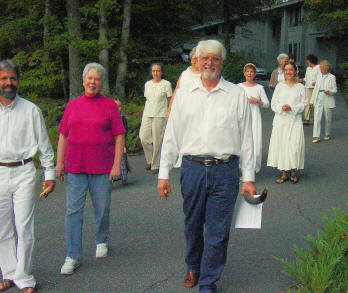
We chose to observe Tashlich, a frequently observed Jewish custom, as part of our Yom Teruah celebration. Tashlich is a Hebrew word that means "casting off", referring to the casting off of sin in our lives. It's customary to walk to a place where there is a body of water and cast pebbles, or bread, into the water. We had studied the parallels between leaven and sin during Pesach/Passover, so we chose to use bread in our Tashlich service. What a wonderful object lesson for the children as well as adults!
We walked to a pond in the neighborhood behind Doug & Lynda's home in Lincolnton.
Most of the group chose to wear white to symbolize our desire for holiness and purity before the Lord.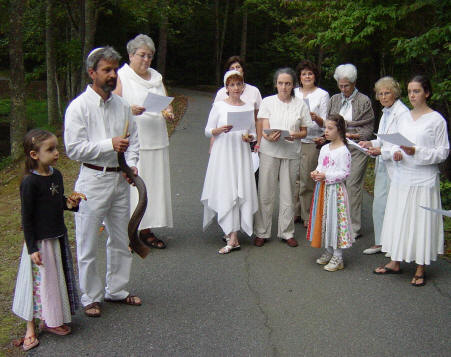
Doug talks to the group about the symbolism behind Tashlich. What exactly is Tashlich? On the afternoon of Yom Teruah, we go to a stream of water containing fish. It reminds us that we are like many fish caught unaware - in our case - in the net of sin. This awareness should encourage us to ask for forgiveness. After "casting" the bread into the water, we carefully examine the corners of our pockets. This reminds us that we should look inside and brush away every trace of evil so that we may be free from sin. Sins are "sticky" and sometimes they really cling and hand on. We should "cast" them far away. Micah 7:18-20 Who is a God like you, who pardons sin and forgives the transgression of the remnant of His inheritance? You do not stay angry forever but delight to show mercy. You will again have compassion on us; You will tread our sins underfoot and hurl all our iniquities into the depths of the sea. You will be true to Jacob, and show mercy to Abraham, as you pledged on oath to our fathers in days long ago.
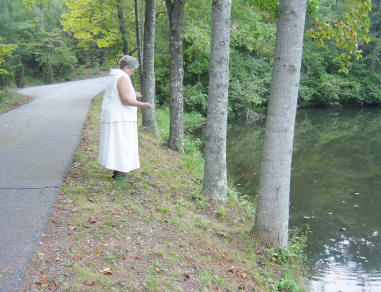
Casting bread, or stones, into the water alone does not bring about the forgiveness of sins,
BUT when accompanied by repentance - it does!After our Tashlich service, we went inside for the remainder of the evening. 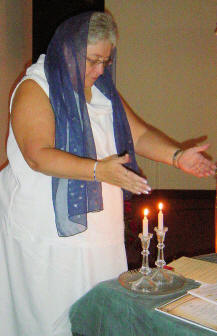
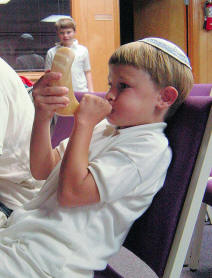
Carolyn lights the festival candles and Peter blows the shofar. Proverbs 22:6 Train up a child in the way he should go; and when he is old, he will not depart from it.
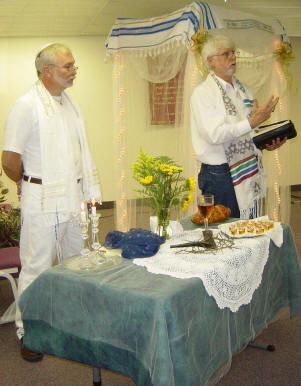
The remaining part of our evening was spent in teaching, festive praise, worship and dance,
as well as a time of communion.
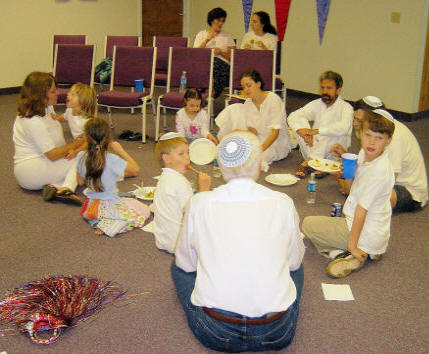
The evening ended with food and fellowship. We had the traditional apples & honey, symbolic of having a good year. Becky had also made some apple & honey popsicles for the kids - the the adults enjoyed them, too.
Leviticus 23:26 -27 And the Lord spake unto Moses, saying, Also on the tenth day of this seventh month there shall be a day of atonement: It shall be an holy convocation unto you; and ye shall afflict your souls...
Traditionally, Yom Kippur is spent as a day of fasting, prayer and Torah study.
Prior to Yom Kippur, we did a teaching about the feast which is described as the most "solemn" day of the Jewish year. We explained how it was observed in ancient times and how Yeshua became the ultimate atonement - not just covering our sins, but totally removing them.
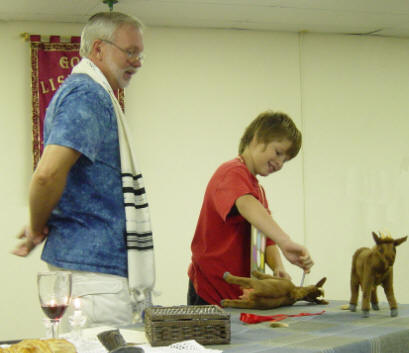
Curtis assists our "High Priest", Sam, with the two goats for Yom Kippur.
The first goat is sacrificed for the sins of the people of Israel. The second, the scapegoat, has a scarlet thread died around his neck and is driven into the wilderness and thrown over a cliff. Another part of the scarlet thread was tied around the door of the temple. Tradition teaches that the scarlet thread would miraculously turn white as the goat met its end, signaling the people that God had accepted their sacrifices and their sins were forgiven.
We also met on Erev Yom Kippur.
We started the evening by reciting a Kol Nidre prayer by Rabbi Louis Jacobs.
Kol Nidre means "all vows".Kol Nidre
by Rabbi Louis Jacobs
"O Lord, what miserable sinners we are. We make promises to live better lives each year and yet always fall far short of keeping them. Help us, O Lord, and pardon us for our shortcomings."It was a wonderful opportunity to again examine our hearts and repent of any sin that was there. We prayed for the church, for Israel and the US. Many of the group chose to do the traditional fast for Yom Kippur.
Rabbi Stewart Weiss, Director of the Jewish Outreach Center in Israel, says that even though Yom Kippur is considered to be a solemn holiday, it can be seen as a day of celebration. The Talmud teaches that it is the happiest day of the year because of the opportunity to repent of our sins and to reconnect our relationship with God. Because of that fact, instead of being solemn, it is celebratory.
Those of us who know Yeshua as the promised Messiah have even more reason to celebrate.
Leviticus 23:34-35 The Lord said to Moses, Say to the Israelites: 'On the fifteenth day of the seventh month, the Lord's Feast of Tabernacles begins, and it lasts for seven days.'
Sukkot, the last of the fall festivals of the Lord, is a seven-day holiday that begins on Tishri 15 - usually in September or October. Sukkot is the most joyous of all the festivals. Leviticus 23:42 Live in booths for seven days...
This was the first year that we, as a congregation, had celebrated Sukkot locally. Usually, we went to a Sukkot conference and celebrated with other Believers there. This year, however, our goal for the congregation was to embrace "ALL" of the festivals together.
Prior to the actual holiday, we chose to teach about Sukkot: constructing the sukka/booth, the Lulav & the Etrog, the ancient water libation ceremony, and Simchat Torah/Rejoicing in the Torah.
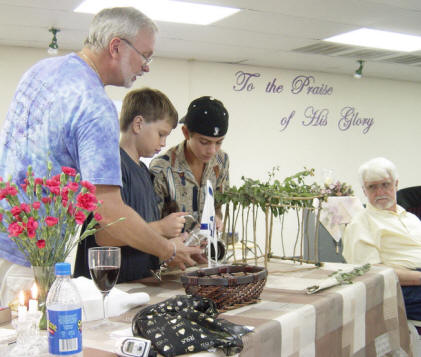
Curtis assists our "two" High Priests, Sam and Cameron, in the water libation ceremony. Israel is a dry land and the rains come seasonally. The rainy season begins after Sukkot in Israel, and prayers for rain were always part of the festival activities.
During the Water Libation Ceremony, the High Priest would go to the Pool of Siloam and carry water back to the temple in a golden flask. There the water would be poured (with wine) into a silver pitcher onto the altar. The High Priest would pray for rain for the coming year. On a spiritual level, the prayer was also for prophetic inspiration.
It was also during Sukkot, in reference to the water libation ceremony, when the following occured...
John 7:37-38 In the last day, that great day of the feast, Jesus stood and cried, saying, "If any man thirst, let him come unto me, and drink. He that believeth on me, as the scripture hath said, out of his belly shall flow rivers of living water."
Doug & Lynda volunteered to let us build the congregational sukka at their home.
Many of the group gathered together for the construction.The frame was constructed... 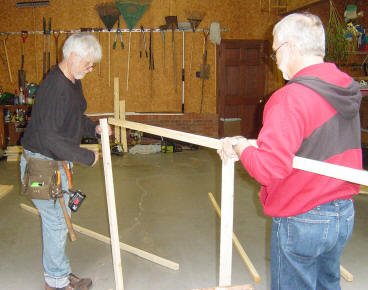
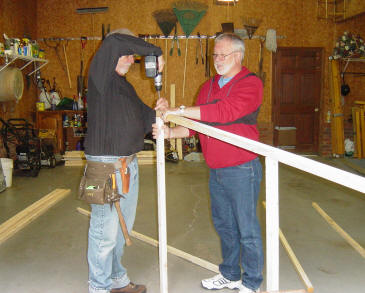
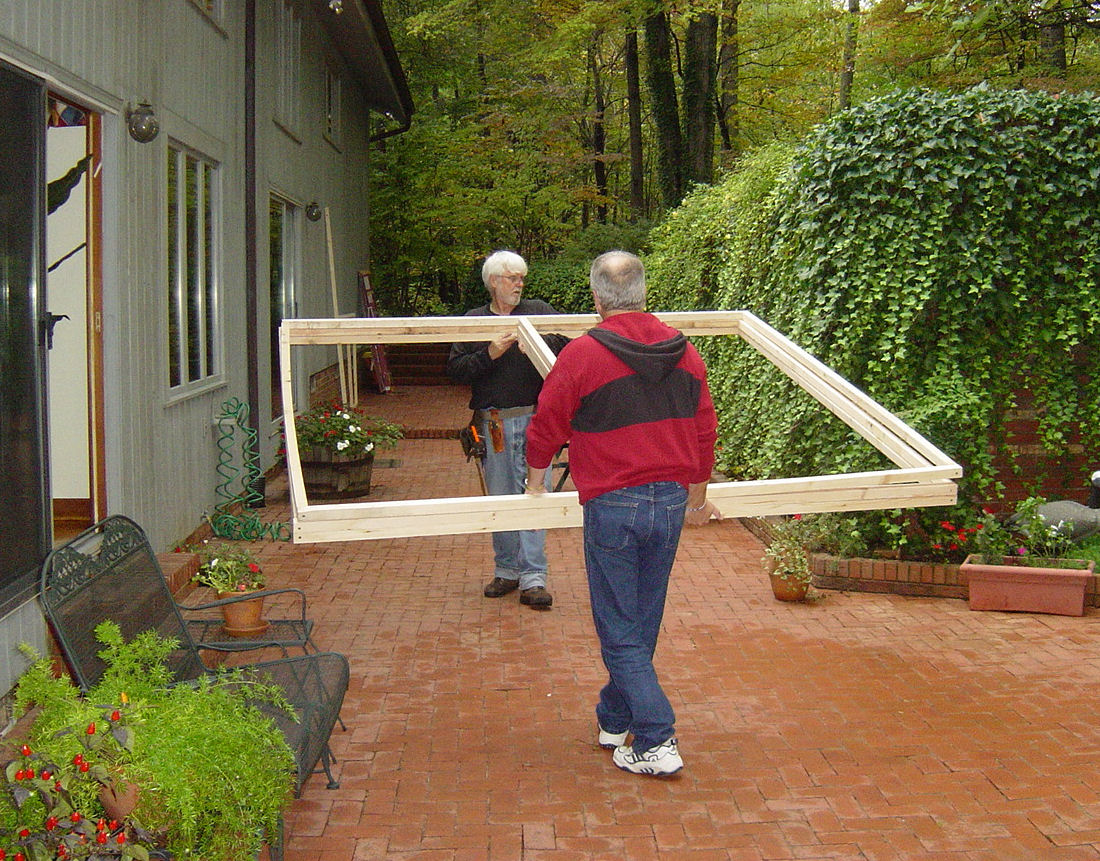
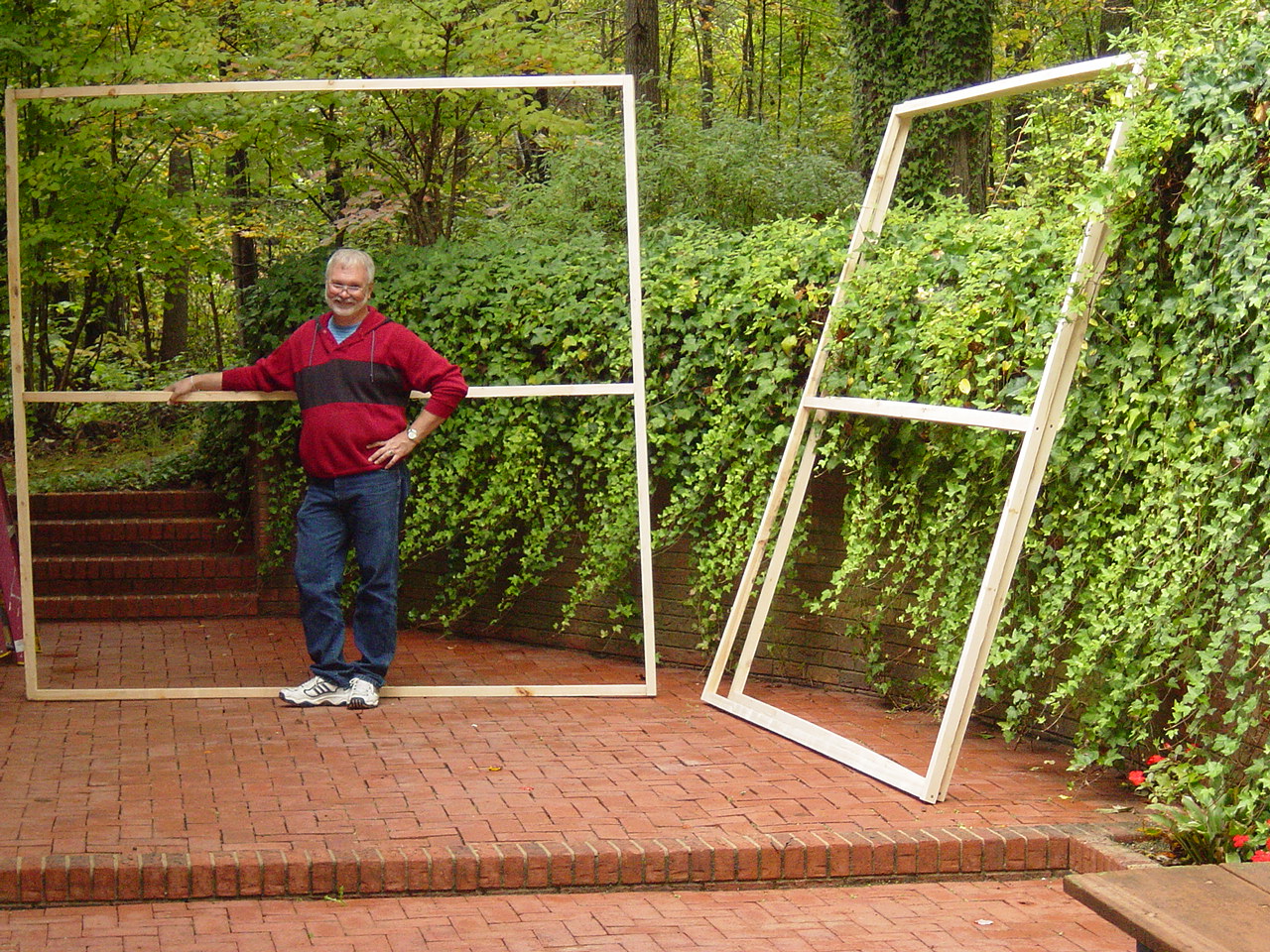
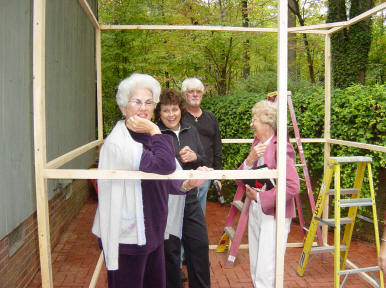
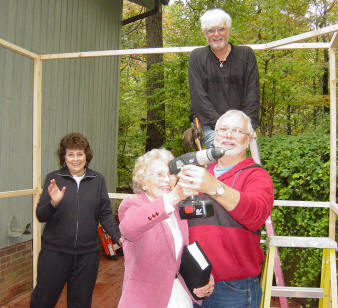
Doris poses in the sukka. Louise gives Curtis and Doug a hand with the drill.
Their excitement at being able to be part of the Sukkot celebration was contagious.
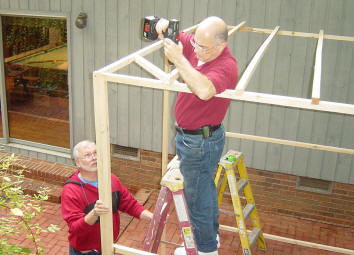
Duke does the construction for the top of the sukka. Three sides of the sukka were covered with fabric...
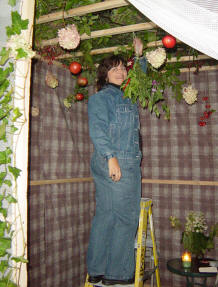
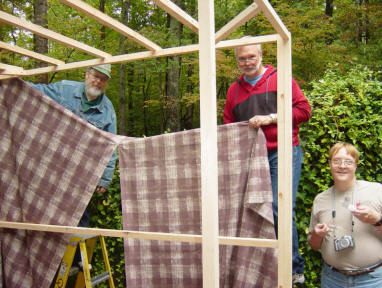
Fruit and flowers were hung from the roof rafters...
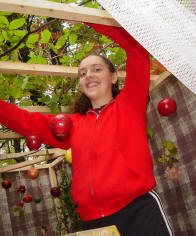
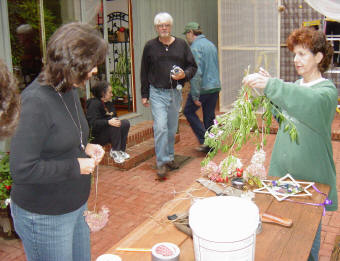
Mary seems to be thinking "I wonder if they'll miss just one of these apples or pomegranates?" Additional decorations were added... 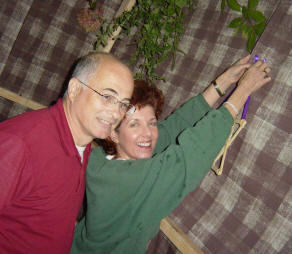
Leafy tree branches provided a roof.
Beautiful! ...and the "finished" product!
During the week of Sukkot, Doug & Lynda shared their sukka with visitors for meals and Bible study almost every day - including three of their grandchildren. 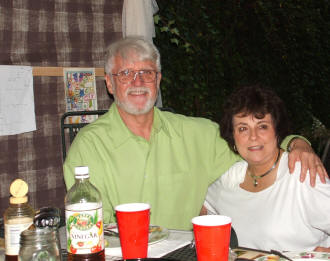
The Torah/Scripture continually reminds us, "Teach your children..." We met as a congregation to celebrate Sukkot 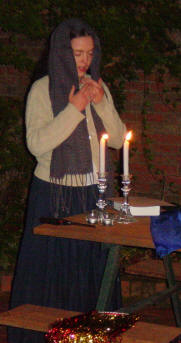
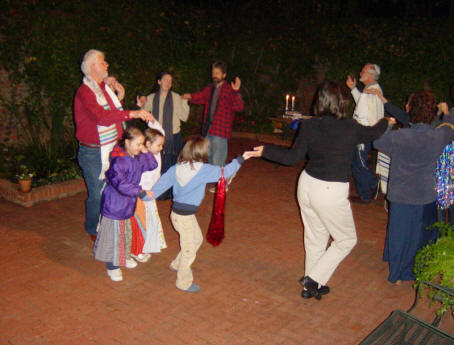
Kate lights the festival candles. The evening included a time of praise, worship and dance. 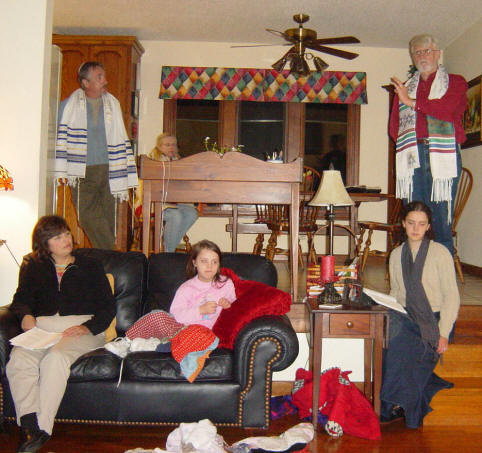
Because of the cold weather, we eventually moved inside. Bill and Doug talked to the group about the Water Libation Ceremony and Simchat Torah. We also took an extended time to pray for the "nations" of the world. Scripture teaches us that during the reign of Messiah, all the nations of the Earth will come up to Jerusalem from year to year to celebrate the feast of Sukkot.
Curtis talked to the group about the use and symbolism of the Lulav and Etrog. "Hodu L'Adonai Ki Tov Ki L'Olam Chasdo"
Give Thanks to the Lord for He is Good. His Mercy Endures Forever!Chag Sameach!
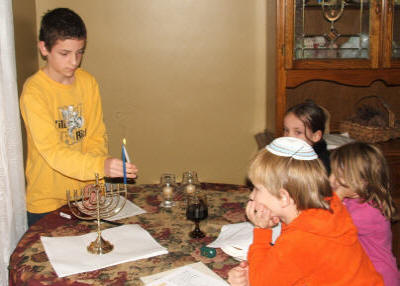
(Left) Lael J. lights the Hanukkah menorah while some of the other children watch. (Right) Afterwards, Myrl lights Shabbat candles. Men from the fellowship participated in a spontaneous play based on the Book of Maccabees, telling the miraculous story of how Yahweh delivered the Jews from the hands of their evil oppressor, Antiochus Epiphanes, and how the temple in Jerusalem was rededicated.
(Left to Right) Curtis (Director), Bill (Saul, the compromising Jew),
Jesse (Emet, another compromising Jew), Kirk (King Antiochus Epiphanes),
Lael (the King's attendant), Doug (Mattathias Maccabee, a faithful Jewish priest),
Paul (Judah, Mattathias' son), Andy (James, another Jewish man not willing to compromise)
